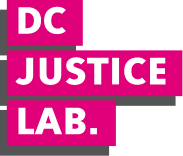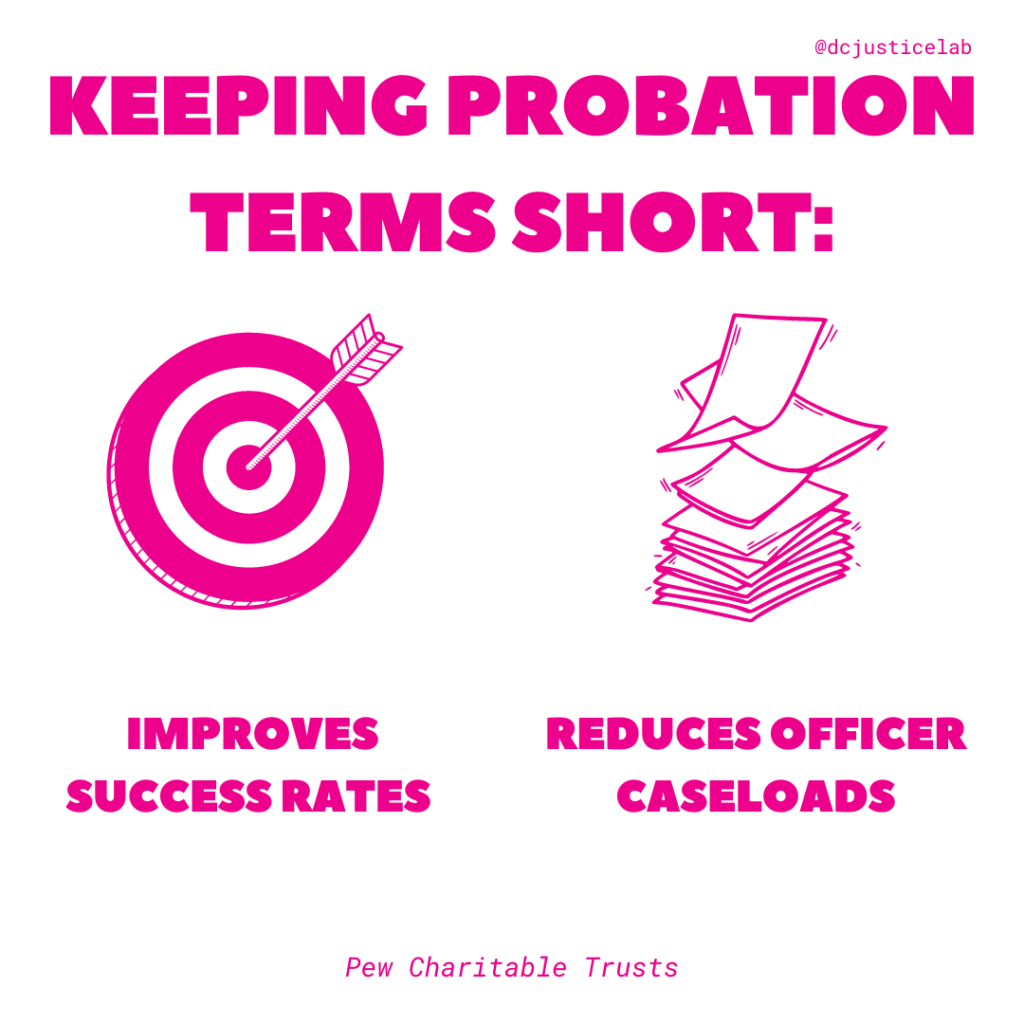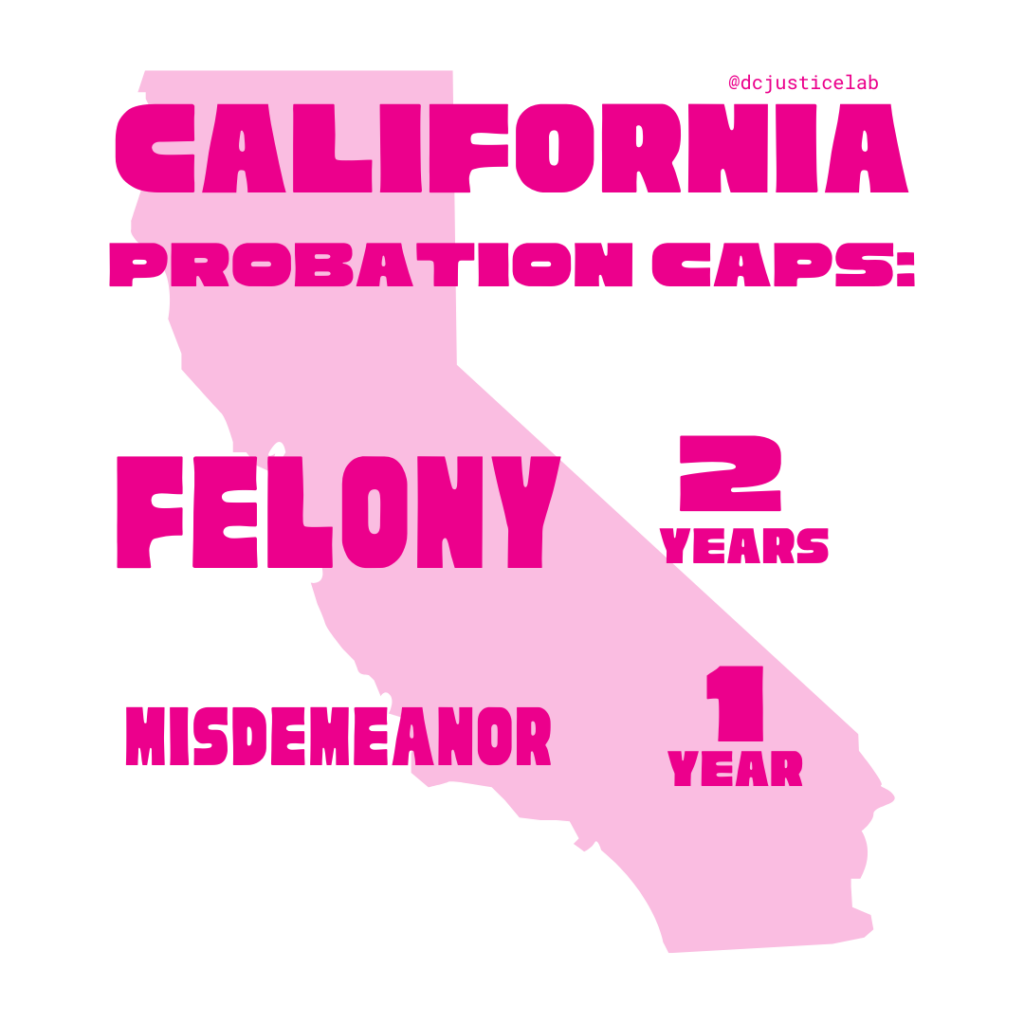
probation caps
Capping probation terms would save DC taxpayers millions of dollars in jail costs.
- 3 Minute Read
Nearly 560 people (8.1 percent) in DC who were on probation in 2022 were revoked to incarceration. Many people fail on probation because the sentence is too long, increasing the chances that someone will make a mistake or slip up. Nationally, after 18 months, most people on probation are not likely to re-offend and could have safely spent less time on supervision. However, in DC, one can be on probation for five years. Places like Kansas and Massachusetts have shorter average probation lengths than DC, and probation sentences in California were capped at two years for a felony and one year for a misdemeanor. California expects to save $2.1 billion from implementing its probation caps. Consistent with the District Task Force on Jails & Justice recommendations, DC should reduce the maximum probation terms to one year for a misdemeanor offense and two years for a felony offense.

What you need to know
Probation is an alternative to incarceration filled with tripwires.
Probation is a sentencing option either after incarceration or instead of incarceration, where the courts attempt to hold a person accountable while in their community. But this alternative can be extremely burdensome oftentimes filled with more barriers and challenges than being incarcerated–constant check-ins, drug tests, required classes, curfews, and travel restrictions. In DC, when someone is sentenced to probation, they are under the supervision of a staff member of the federal Court Services and Offender Supervision Agency (CSOSA), which also supervises people released from prison. In 2022, there were 4,439 people on probation in DC – about nine out of 10 of whom are Black. DC’s elected officials have no oversight over CSOSA’s practice.
Long probation terms do not increase safety.
The longer the probation period, the more likely someone is to fail to complete probation. However, research shows that long supervision terms do not increase safety. In a comparative look at the length of probation and the likelihood of recidivism, Pew Charitable Trusts found that “a growing list of high-quality studies have shown that long probation sentences are not associated with lower recidivism rates.” Generally, if someone is re-arrested while on supervision, it usually happens within the first 18 months, making probation terms longer than two years a waste of time and money.
DC probation terms can last five years, but probation lengths are capped at less in other jurisdictions.
Someone can be on probation supervision in DC for up to five years. In practice, most judges stay below the statutory bar. CSOSA reported that most people on probation for both felony and misdemeanor offenses were under its supervision for 12 to 37 months. The American Law Institute recommended that probation terms be capped at three years for a felony and one year for a misdemeanor. The Pew Charitable Trusts showed that states like Louisiana (3 years), Oklahoma (2 years) have shorter maximum probation terms, and Massachusetts (9.9 months), Kansas (9.3 months), and Florida (16.8 months) have shorter average probation terms than DC. Between 2000 and 2018, 22 states saw the average length of someone’s probation decline.
Longer probation sentences increase costs, but limiting sentence lengths could save millions.
California limits most misdemeanor probation sentences to one year and felony probation sentences to two years. The state is expected to save $2.1 billion by making this change. This will come by reducing the probation population and preventing people from entering prison or jail due to a technical violation. In 2018, on average, the DC Department of Corrections spent $241 per person incarcerated per day. Per year, DC pays – at a minimum – $21,499 per person whose supervision was violated over one year because, at a minimum, they are in jail for 89 days. The DC Department of Corrections reported that 6.9 percent of the jail population – or 346 people–entered the jail for a supervision violation in 2023. At a minimum, that would cost taxpayers $7.4 million dollars. But, if just 100 of these intakes were prevented by limiting supervision lengths, DC could save between $2.11 million.
WHERE TO LEARN MORE
District Task Force on Jails & Justice February 2021
Portland State University June 2022
The Washington Post October 2023
Reform Alliance September 2020
Pew Charitable Trusts December 2020
special thanks
Pew Charitable Trusts ★ Prison Policy Initiative ★ Jessa Royer ★ REFORM Alliance ★ Vincent Schiraldi ★ Jason Ziedenberg




